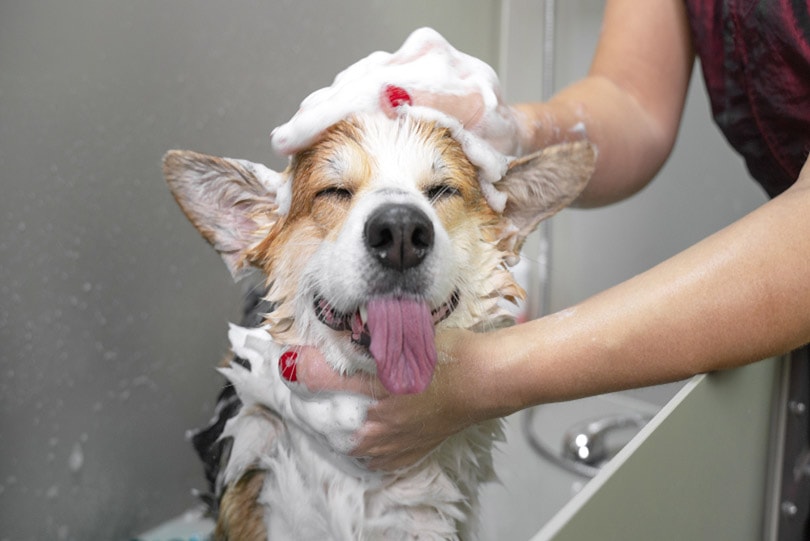How to Prove Ownership of a Dog: Custody Dispute & Stolen Dog Laws
Updated on

Click to Skip Ahead
Two of the most devastating situations for a dog owner are when their dog is stolen or when you’re caught up in a vicious pet custody battle. In situations like these, you’ll need to be able to prove you do, in fact, own your dog. Your dog knows it and you know it, but the law is a little more finicky on the matter. Ideally, you want to establish ownership with documentation before your dog is in jeopardy, but it may not be clear how exactly you do it. To help you, let’s check out how exactly you can prove ownership of your dog in the event they’re stolen, lost, or in the midst of a custody battle.
Before You Begin
Ideally, you’ll have some records from early in your dog’s life that establish you as their owner, and the best way to prove ownership is to ironically prevent ownership from being called into question at all. That’s easier said than done, though, depending on your exact legal situation and the laws where you live. To be prepared for the worst, you should keep copies of your dog’s identifying paperwork in your car and home.
To be safe, let’s check out the definitive list of items that help prove ownership of your dog. You may not have all of these, and that’s okay, but gather what you can!

Helpful Items for Proving Dog Ownership
- Vaccination records
- Adoption records
- Microchip registration
- Animal registration
- Collars with ID tags and your contact info
- Recent photos of your dog, preferably large physical photos from multiple angles
- Written agreements naming you as the dog’s owner
The 3 Essential Tips on How to Prove Ownership of a Dog
1. What to Do if Your Dog Is Lost

As soon as you notice your dog is missing, immediately check the places outside where they typically go. Check your yard, ask your neighbor for permission to look on their property, and search nearby green areas. Along the way, ask people if they’ve seen your dog—a photo helps tremendously here.
If your dog doesn’t turn up soon, they could be lost or even stolen, so you need to take more drastic steps to locate them and bring them home safely. Print out any recent photos of your dog, print out flyers and put them up in your neighborhood, and consider posting on social media community groups to spread awareness.
If you manage to locate your dog but they seem scared or skittish and run away from you, be patient. Put out some food and water in their dishes for them to stay nourished, arm yourself with their favorite treats for when you see them next, and avoid bringing other pets outside when your dog is on the loose, as other animals can drive them away by accident. With time, your dog is sure to come back home to you.
2. My Dog Was Stolen! What Do I Do Next?
Dog theft is unfortunately common, driven by a black market demand for designer dog breeds that can be “flipped” or sold for profit. If you find out that someone has stolen your dog, things get more challenging because you need to involve the authorities and prove you legally own your dog.
First, check your state’s laws on dog theft. Unless you live in one of 15 states that have a specific law for it, dog theft is typically considered regular old theft. We know, it’s messed up, but the law is the law. Next, contact local authorities and file a report. Provide as much information as possible, including proof of ownership, your contact info, photos, and any photo evidence of the thief absconding with your dog.
Do not approach the person(s) who stole your dog under any circumstances because you don’t know what they’re capable of, if they’re armed, or if they have accomplices. We know it’s not easy, but things are in the law enforcement’s capable hands now. Cooperate with them to the fullest extent of the law and things will surely work out for you and your dog.

Dog custody after divorce is a thorny legal matter that’s difficult to advise on because of wildly shifting laws across the states. However, there’s some hope. Laws may change, but judges take certain key criteria into account when deciding how to assign or divide up pet custody in divorce cases.
First, let’s look at what those criteria are so you can be prepared when the judge starts asking questions.
Key Dog Custody Criteria
- Who purchased the dog and paid for essential services, like vaccinations and medical services?
- Who primarily cares for the dog? This includes feedings, potty breaks, walks, and recreation.
- The relationship and custody status of children—cherished family pets often go with the kids.
- The emotional connection between the dog and each party.
- Which party is most willing and able to care for the dog post-divorce?
Now that you’ve got an idea of what the judge will ask, we can take a look at some tips for traversing the pet custody process within the context of your upcoming divorce case. These aren’t guaranteed to win you custody, but every little bit helps.
Tips for Winning Pet Custody
- Gather all relevant documentation, including medical records, dog groomer receipts, dog training receipts, or calendars marked with dog-related occasions.
- If you didn’t buy your dog but are the primary caregiver, document Videotape your daily routine, write down trips taken with your dog, and track times you had to care for your dog, including post-operative care like medication.
- Collect photos and social media posts of you with your dog for reference.
- Write down any concerns you have about your spouse caring for your dog, including past incidences of pet abuse.
- Reach out to dog groomers, trainers, family, friends, and pet-related staff at establishments you frequent with your dog to act as references.
- Abide absolutely by any and all conditions dictated by the court related to the care of your dog, including court-mandated custody arrangements.
Conclusion
Proving ownership of your dog is a harrowing process, but you can take some of the sting out of it by keeping meticulous records related to everything about your pet, including records, photos, and more. Depending on your state’s laws and whether your dog was stolen or caught up in your divorce, you may have to furnish proof that satisfies the court or law enforcement.
Featured Image Credit: Alex_Maryna, Shutterstock












